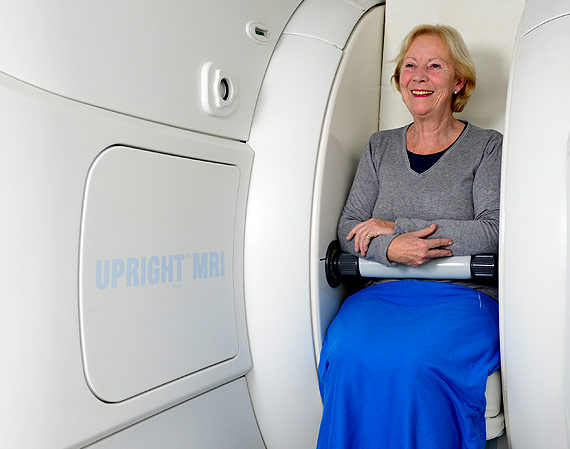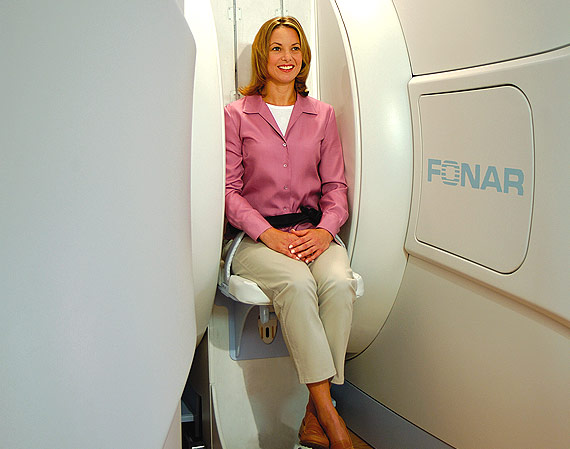Claustrophobia with MRI
Claustrophobia with MRI is extremely common and tunnel MRI scanners can be particularly anxiety-provoking and traumatic, as patients must lie still in a tunnel for between 15 and 90 minutes. Some patients even need sedation to stay calm enough to get through the experience.
MRI imaging is one of the most important medical innovations in the past 30 years, but worldwide two million scans a year cannot be completed because the patient is too frightened of the procedure, potentially putting their health in jeopardy.i One study found one in four patients reported moderate to severe anxiety during their tunnel MRI scan.ii

What is claustrophobia?
The charity Anxiety UK describes claustrophobia as an irrational fear of being in a confined space. Even though there is no threat or danger the patient develops a fear of confinement.
Experts say this usually stems from a one-off trauma, such as being kept in a confined space usually in childhood, bullying or abuse or having a parent with claustrophobia. The phobia affects around one in 10 people.iii
Symptoms of claustrophobia can include hyperventilation, a racing heartbeat, raised blood pressure, nausea, trembling, headaches, a dry mouth, sweating, ringing in the ears, dizziness, confusion, and a butterflies in the stomach sensation.
Claustrophobia sufferers will often go out of their way to avoid the situations that trigger their symptoms, but avoidance only makes their fear even stronger and can severely limit their lifestyle.
What are the alternatives to tunnel MRI scanners?
If you need an MRI scan but feel that lying down in a tunnel scanner for an extended period may trigger claustrophobia symptoms, you may want to consider an upright open scanner where you are scanned in either a sitting or standing position, as an alternative.
An open MRI or upright MRI scan does not involve any confinement and patients report they find it much less threatening and a more dignified experience. Even the head coils used for brain scans are designed to be open with a clear view of the outside of the system.

Open MRI scanner machines can put anxious patients at ease so they can talk to relatives or friends and the radiographer throughout the procedure for reassurance. This is particularly helpful for young people (from 16 years old), who may want their parents with them, or those with learning difficulties or dementia, who need support. Patients can also watch television on a 50-inch screen. All the emphasis is on making the open MRI as stress-free, relaxed, and dignified as possible.
Open MRI scanners are a stress-free alternative to using a conventional enclosed tunnel MRI scanner, providing comfort and reassurance for people who suffer from anxiety or claustrophobia.
Medserena is a premium private provider of open MRI in the UK (and Germany) offering a comprehensive range of different MRI scans, covering the brain, spine, back, parts of the abdomen, hips, limbs, and pelvic region. All open MRIs are performed according to strict clinical protocols by highly trained radiographers. Our mission is to combine a calm and comfortable scanning experience with exceptionally accurate MRI diagnostics and expert interpretation of results from experienced and qualified radiologists.
The scanners Medserena use are also slightly quieter than tunnel scanners, so may be more tolerable if you suffer from noise sensitivity as well as claustrophobia, and there’s no need to wear headphones.
Waiting times for an appointment are minimal, and patients receive a written medical report within 48 hours of their open MRI. Medserena even offer patients the opportunity to visit the premises and see the scanner prior to their appointment to familiarise themselves with the equipment and have the procedure explained to them before deciding to go ahead.
Advantages of an upright MRI scan
- Weight bearing views: Open MRI scans can also potentially pick-up problems missed or underestimated by conventional MRI scans as they use variPOSE a technique developed by Medserena to take scans of patients in natural weight-bearing positions: including sitting, standing, bending, and extending.
This allows for a more accurate view of the effects of gravity on joints and soft tissue. Most scans at Medserena are done seated or standing to show the effects of gravity. The spine is exposed to a pressure five times greater when sitting rather than lying down, and so an open MRI scan may reveal problems either not visible or underestimated in the supine (lying flat) position in a conventional scanner.
They can be particularly useful for picking up causes of spinal instability, including spinal fusion, as well as spondylolisthesis (a common condition where vertebrae in the back slip out of position).

- Suitable for heavier patients: Open MRI scans are also a more comfortable solution for larger/ heavier patients who might have difficulty fitting comfortably into a conventional tunnel scanner, as they can accommodate weights of up to up to 35 stone (226kg).
However, suitability will depend on the patient’s build and the area of anatomy that needs to be scanned.
